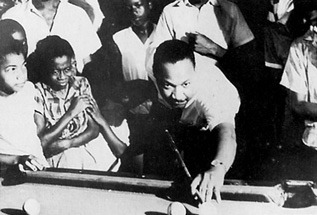In commemoration of Martin Luther King Jr. Day, UNMC Today will feature a series of photos and quotations from the civil rights leader. Today’s excerpt looks at the semantics of being black or white.
The series will culminate Jan. 20 at noon with a presentation by Diane Ariza, Ph.D., assistant dean of multicultural affairs at Albion College in Albion, Mich., and former director of multicultural affairs at the University of Nebraska at Omaha.
Free pizza and soda will be available for the first 300 guests at the Storz Pavilion. A live videotape presentation of Dr. Ariza’s presentation will be available for overflow audience members at the Wittson Hall Amphitheater.
 “Where do we go from here? First, we must massively assert our dignity and worth. We must stand up amidst a system that still oppresses us and develop an unassailable and majestic sense of values. We must no longer be ashamed of being black. The job of arousing manhood within a people that have been taught for so many centuries that they are nobody is not easy. Even semantics have conspired to make that which is black seem ugly and degrading.
“Where do we go from here? First, we must massively assert our dignity and worth. We must stand up amidst a system that still oppresses us and develop an unassailable and majestic sense of values. We must no longer be ashamed of being black. The job of arousing manhood within a people that have been taught for so many centuries that they are nobody is not easy. Even semantics have conspired to make that which is black seem ugly and degrading.
In Roget’s Thesaurus there are 120 synonyms for blackness and at least sixty of them are offensive, as for example, blot, soot, grim, devil and foul. And there are 134 synonyms for whiteness and all are favorable, expressed in such words as purity, cleanliness, chastity and innocence. A white lie is better than a black lie. The most degenerate member of a family is a “black sheep.” Ossie Davis has suggested that maybe the English language should be reconstructed so that teachers will not be forced to teach the Negro child sixty ways to despise himself, and thereby perpetuate his false sense of inferiority and the white child 134 ways to adore himself, and there by perpetuate his false sense of superiority.”
Excerpt from Where Do We Go from Here: Chaos or Community?, Martin Luther King, Jr. (Harper & Row Publishers, 1967).
Photo from Pillar of Fire: America in the King Years 1963-65, by Taylor Branch, Simon & Schuster, 1998.